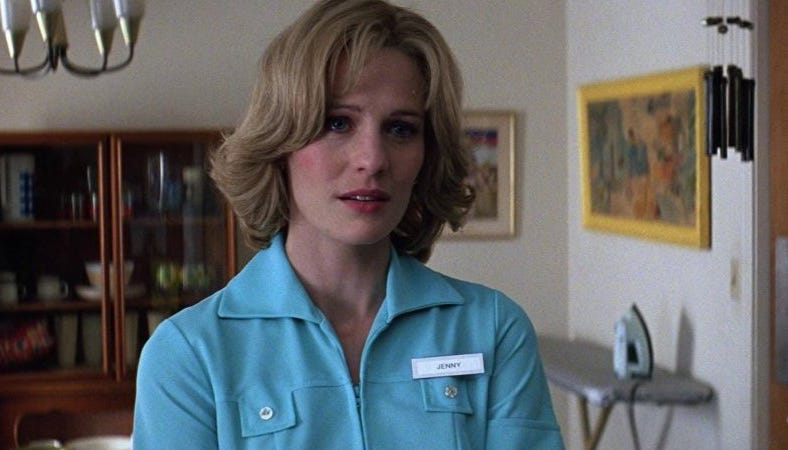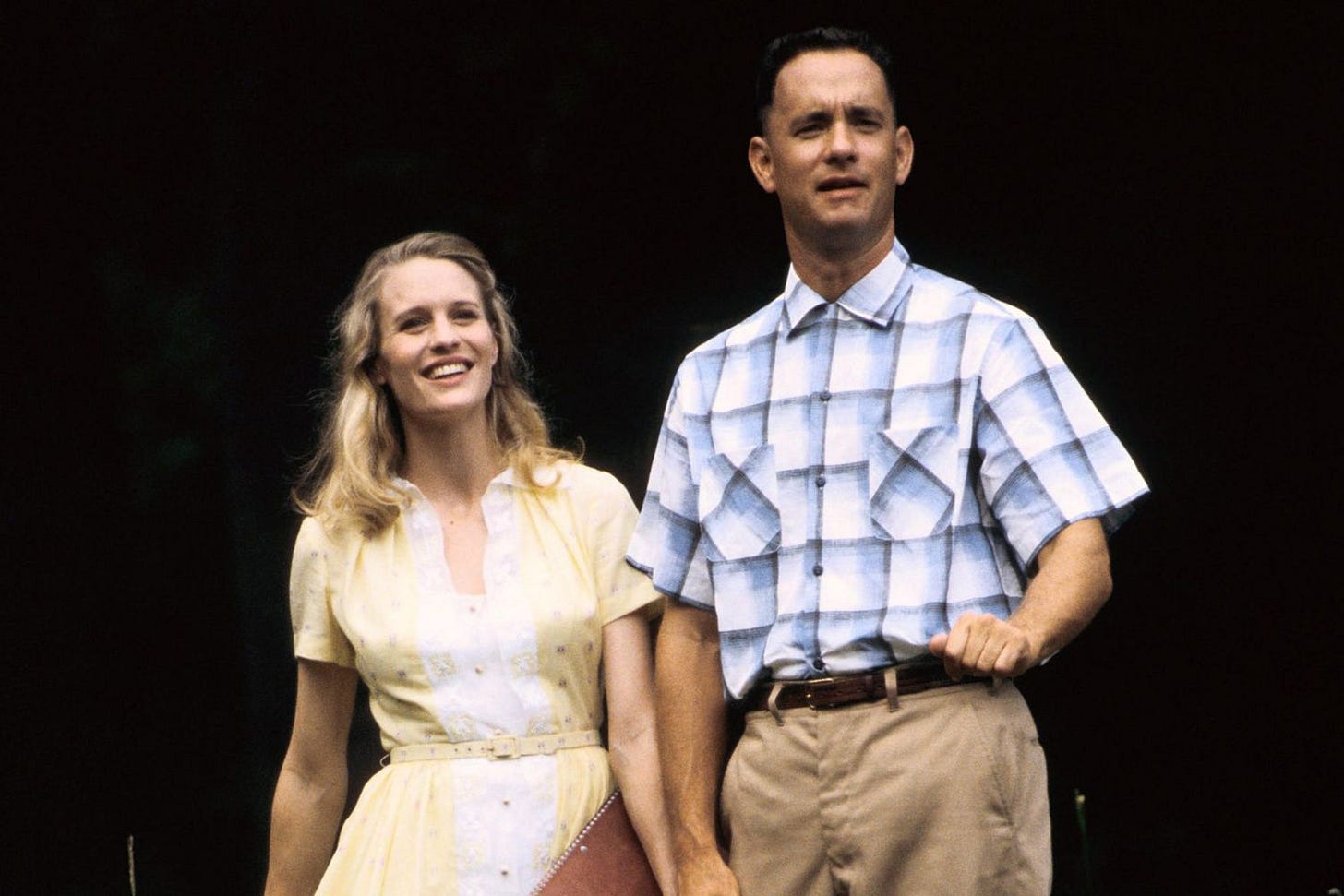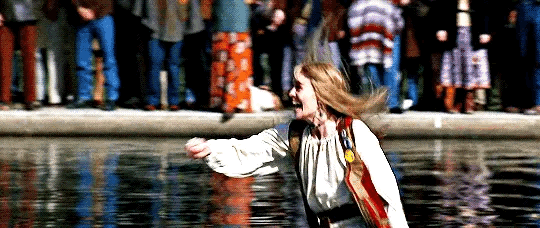(Paramount Pictures)
This July marks the 30th anniversary of Robert Zemeckis’ beloved historical epic Forrest Gump (1994). Or as I like to joke, “a movie only Baby Boomers and ‘90s kids will understand.” And maybe some of Gen X. As we’ve seen, though the blockbuster was huge with audiences and critics, over the years, Forrest Gump has gradually grown to be very divisive with film fans. This was most apparent when the classic was re-released in IMAX for its 20th anniversary back in 2014 and reportedly flopped. Many arguments have been made on why Forrest Gump’s popularity has waned some over the years. The seemingly conservative politics throughout the story, the supposedly corny sentimentalities and overly wholesome atmosphere, maybe casting Tom Hanks as a mentally slow southern man is a bit on the nose [though he did win his second Best Actor Oscar for his performance]. Zemeckis’ rise and fall trajectory has been so extreme some are wondering how he went from the creator of the iconic Back to the Future (1985) to crap like Pinocchio (2022). But what stands out the most on how people contemporarily feel about Forrest Gump, is the female lead, Jenny Curran played by Robin Wright.
Something that isn’t brought up much in discussions these days is how in this dramedy that spans three decades, 1950s-1980s, everything exciting and cool in history happens to pure and innocent Forrest, while everything depressing and grim in history happens to troubled and abused Jenny. I can remember feminist movie fans accusing Zemeckis and screenwriter Eric Roth of sexism for the male protagonist’s love interest only experiencing happiness when she officially gets together with him. [I’ve never read Winston Groom’s original 1986 novel, so I can’t confirm how Jenny is portrayed there.] I’ll admit, I did find this distracting for a period in my early 20s, but over time realized the characters are a lot more complex than maybe some give them credit for. But interestingly enough, the Jenny discourse in the modern era is not about how she suffers for most of the 2 ½ hour runtime. No, for the past 15 or so years, anytime I’ve come across Forrest Gump brought up on sites like Twitter, Reddit, and most predominantly YouTube comments, there have been people going into very lengthy detail on how they feel about Jenny. About how she is just a selfish freeloader who only returns to Forrest when she needs his help or money and is her own worst enemy who deserves to die at the end of the story for taking advantage of a well-meaning man and putting her son in danger. She sucks, just the worst character in fiction.
…Jenny from Forrest Gump??? I have to say, I was one of those millennial kids who watched Forrest Gump constantly while I was growing up. One because it was so popular. Two because it is, to this day, still regularly in TV syndication. And three, because I just love watching it, as well as listening to its equally good soundtrack. I never once thought: “Oh, there’s actually a bad guy in this story, and it’s Jenny.” But it is now impossible to have conversations about this movie on social media without someone going into a diatribe about how ‘awful’ Jenny is. When I quickly realized how evident this opinion was with male moviegoers, I started using the blonde as a litmus test for guys near the end of my college years. This is pretty amusing in retrospect, but at the time, I thought, “I clearly can’t trust any dude who goes out of his way to hate Jenny.” On top of the over the top, bombastic tone of these ‘essays,’ a lot of them just kind of feel vaguely misogynistic and an excuse to complain about a fictional woman.
Let’s get into the backstory on one Jenny Curran Gump. At the beginning of the movie, we see a cute little girl in 1951 Alabama who is a victim of child abuse and ultimately brought up by her grandmother after the police step in. As an adult, she goes from college dropout to stripper to hippie street musician to waitress and single mother before marrying Forrest to complete a family. In between all this, Jenny’s romantic relationships and drug addiction keep getting worse and worse. Her tragic conclusion is fatally contracting a mysterious disease so new that “the doctors don’t even know much about it.” [In modern context, most viewers assume Jenny died from Hep C or AIDS.] As the saying goes, Jenny’s been through it. I think it’s safe to say Robin Wright’s acting in Forrest Gump is blame free. Out of all the complaints I’ve ever seen about her character, her performance is never mentioned as one of them. And unsurprisingly, since Robin is now considered one of the best actresses of her generation, whether playing Princess Buttercup in Rob Reiner’s The Princess Bride (1987) or Jenny or First Lady Claire Underwood on Netflix’s “House of Cards” (2013-18).
Back to Jenny, there’s usually one scene her haters like to single out as an example of how terrible she is. It’s when Forrest pushes a couple of male patrons for harassing Jenny while she fails to use her a stripping gig as a way to showcase her music. The young woman then takes her anger—which was initially aimed at the jerks—out on Forrest and accuses him of being ignorant and unable to understand love. While she is clearly out of line with her outburst, I think viewers need to consider the context of Jenny’s life in the moment. She was recently kicked out of school and desperate for money, as well as very young at roughly 19/20. She’s not only still experiencing the effects of childhood trauma, but also in that early stage of life where you don’t notice the world outside of yourself. As the film progresses, we see Jenny mature, although with some stumbles along the way. By the time she’s in her mid-20s, she’s given up on a music career and is a druggie socialite. It’s not pretty, but I think it’s fairly obvious she knows Forrest is too naïve to fully recognize what’s wrong with her life and doesn’t want him to get sucked into her problems. Even when he proposes, Jenny tells Forrest he wouldn’t want to be married to someone like her. But Forrest, being the kind man that he is, knows his old childhood friend can defeat her demons and start all over again with their love. I think it’s shallow to just obtusely assume Jenny only visits and later lives with Forrest because he’s successful and got lucky with money. She still considers him the best friend she’s ever had and isn’t going to completely ditch him just because they grew up to be different people.
(Paramount Pictures)
It’s funny to me that this narrative on Jenny having bad intentions coincidentally started around the same time some women tried to sympathize Nurse Ratched from Miloš Forman’s One Flew Over the Cuckoo’s Nest (1975) as a lady who was “just doing her job.” This makes even less sense than trying to rationalize Jenny from Forrest Gump as evil. If Nurse Ratched was a real person in 2024, she would probably lose her license for manipulative and triggering tactics upon her patients. [And while I’m here, if any female authority figure in film is getting revisionism, it should really go to ‘Hot Lips’ from Robert Altman’s MASH (1970), who literally was just doing her job.]
Anyways, this is getting off topic now, so I’m just going to stop while I’m ahead. I don’t expect everyone to love Forrest Gump as much as I do. I’m fine with people having fictional characters they might irrationally give a hard time. I do the same thing [though mostly in jest] about Kevin’s dad in Chris Columbus’ Home Alone (1990). I just miss when we could talk about a good movie without dogpiling on a misunderstood character.






Good one Meg. Agreed. I had no idea tvrrr was Jenny hate.
I am right there with you! Great read.